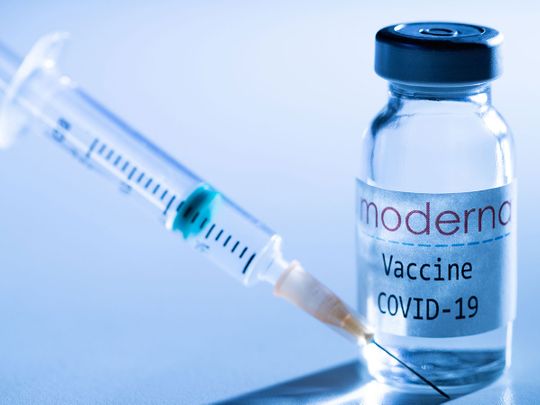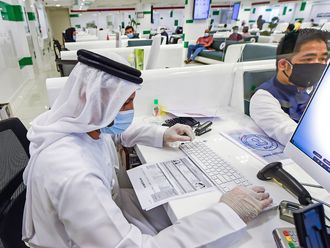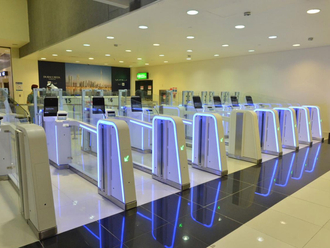
Dubai: The health care community in the UAE has welcomed the decision of the approval provided for the emergency use of the Moderna vaccine made by the US biotech firm Moderna. The UAE Ministry of Health and Prevention granted the emergency-use registration to Moderna vaccine on Sunday, marking a new phase in the accelerated vaccination drive in the country.
Since the vaccine rollout programme for UAE was initiated in December 2020, over 15 million doses of the COVID-19 vaccine have already been administered to the public so far. The move to introduce Moderna comes after the vaccine brand had completed the mandatory clinical trials and strict assessment trials for local emergency use, said Dr Amin Hussein Al Amiri, Assistant Undersecretary of the Health Regulatory Sector at the UAE Health Ministry.
With this, the number of vaccines approved for emergency use in the UAE so far has gone up to five. Gulf News spoke to Dr Adel Al Sisi, Chief Medical Officer and head of ICU at Prime Hospital and Dr Pawan Srivastava, Consultant Internal Medicine at NMC Specialty Hospital, Al Nahda, Dubai, for an overview of the vaccine story so far.
Which are the vaccines approved for emergency use in the UAE so far?
Five vaccines have emergency-use approval in the UAE. They are:
Sinopharm
Pfizer
Oxford AstraZeneca
Sputnik V
Moderna
What are the specifications of Moderna?
Like Pfizer vaccine, the Moderna vaccine is a Messenger RNA (Ribo Nucleic Acid) technology product. RNA plays a vital role in protein synthesis in the body. In other words, the RNA copies a protein sequence that it requires to produce. The MRNA then enables the cells to produce the same protein (in this case the protein to counter the attack of the COVID-19 virus). The body stores this memory and when it comes in contact with the spiked COVID-19 protein it is able to produce a strong immune response to counter it.
Two doses of the Moderna vaccine can be administered in a gap of minimum two weeks but the desired gap is that of 28 days. In case of a shortage, the second dose can be provided within a maximum gap of four months.
Moderna and Pfizer are MRNA vaccines; Astra Zeneca uses double-stranded DNA while Sinopharm uses a deactived COVID-19 virus. Sputnik V is an adenovirus viral vector in which the Sars-COV-2 gene has been integrated.
What does Emergency Use Authorisation actually mean?
Usually, vaccines have to be tested for many years to demonstrate effectiveness and safety even before it can be tested for efficacy. This requires several tests on people for many years before a decision for permanent use can be made. In an unusual public health crisis like the COVID-19 pandemic, where it is important to give access to vaccines to the public, an emergency use authorisation has been used. An Emergency Use Authorisation (EUA) is a mechanism to facilitate the availability and use of medical countermeasures. Since the pandemic impacts the whole world and the capacity of one vaccine manufacturer is limited, such emergency use authorisation helps other manufacturers to help mitigate the shortage as all the vaccines that have been approved for emergency use have passed the basic trials for effectiveness and safety. It also means that the research and trials on all these vaccines approved for emergency use are ongoing and the results will be updated from time to time. A vaccine can be in circulation permanently only after it clears the long-term clinical trials.
With new mutants and variants of COVID-19, how can the vaccines prove effective in providing immunity?
Given the emergence of multiple new variants especially Delta variant, the health sector is constantly evaluating vaccine efficacy.








